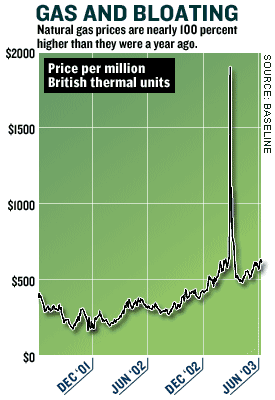NEW YORK (CNN/Money) -
At first blush, it's hard to see why Federal Reserve Chairman Alan Greenspan testified before Congress Tuesday about natural gas. Did he get a degree in geophysics while we weren't looking?
| 
| |

| 
| 
|

|
 Prices for natural gas are almost double the levels of a year ago during what is usually a slow season. CNNfn's Ceci Rodgers reports. Prices for natural gas are almost double the levels of a year ago during what is usually a slow season. CNNfn's Ceci Rodgers reports.
|
|
Play video
(Real or Windows Media)
|
| 
|

|
|
But if you consider the possible economic impact of high natural gas prices, driven by a severe supply shortage, Greenspan's attention to the topic makes more sense. Some economists worry lingering high prices could hamper the economy's sluggish, jobless recovery from a recession in 2001.
"We're going to see some erosion in a number of macroeconomic variables" if gas prices stay high, Greenspan told the House Energy and Commerce Committee.
Along with other energy prices, natural gas prices soared in the weeks before the U.S.-led war with Iraq. But, despite a drop after the war, prices still are nearly 100 percent higher than they were a year ago.
During the winter, prices were supported by brutal weather. Now, however, they're being supported by a shortage in supply -- inventories are about 29 percent below their five-year average, according to the Energy Information Administration of the U.S. Energy Department.
Businesses feel impact
To be sure, unless they are particularly cold blooded, most households won't feel the pinch of higher natural gas prices this summer, since they use natural gas mainly for home heating.
But businesses that use natural gas for day-to-day operations already are suffering.

Lincoln, R.I.-based Technical Materials Inc. (TMI), which makes specialty metal products for computers, automobiles and telecommunications, needs natural gas to run its annealing furnaces. Higher natural gas prices are adding to the burdens TMI and other manufacturers already bear, including competition from overseas manufacturers.
"In the marketplaces we serve, we have no opportunity to raise prices because there's too much capacity and competition," TMI President Al Lubrano said. "Ultimately, higher natural gas prices erode our ability to be profitable."
In an economy that needs a rebound in corporate investment and hiring to thrive, this is not good news.
Ironically, if economic growth picks up in the second half of the year -- as most economists hope it will -- then the increased activity will fuel demand for natural gas, driving prices even higher and possibly undercutting the rebound.
"As the economy gains traction, we'll have demand increasing. And if we have supply contracting, it's a deadly mix," said Anthony Chan, chief economist at Banc One Investment Advisors. "We will end up stunting any potential recovery."
Looking for legislative solution
Inspired by warnings from Greenspan and Energy Secretary Spencer Abraham, lawmakers are discussing possible solutions -- although some of them, including plans to drill for gas in environmentally protected areas, are political hot potatoes.
The good news is that many manufacturers are able to switch back and forth between using natural gas and oil; such businesses will dodge the bullet of higher gas prices, even as their business picks up.
And many businesses make deals with gas distributors to lock in prices for a period of time, shielding them from fluctuations in the market.
Pine Hall Brick, a Winston-Salem, N.C.-based brickmaker that uses natural gas to fire its kilns, bought supply for most of the summer back in March, when all the effects of a brief, war-related spike in prices had disappeared -- although prices still were historically very high.
But when it comes to buying gas for the rest of the year, Pine Hall Brick, which has benefited from a boom in new-home building, has to play a nerve-wracking guessing game -- should it lock in prices now, before they get even worse, or cross its fingers and hope prices finally fall?
"We can still be profitable as long as business is good, but it's eating into our margins considerably," said Pine Hall Brick President Fletcher Steele. "If the housing market does slow down a bit, that, combined with higher costs, is really a double whammy we don't want to see."

|

